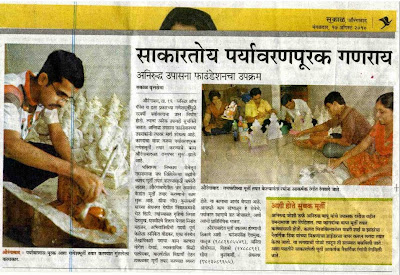Eco Friendly Idols or Lord Ganesh (Shree, Ganapati) made from Paper Maché (pulp) by the Aniruddha Upasana Trust.
Eco friendly Ganpati Procedure :-
With the grace of P. P. Aniruddha Bapu, Sadguru Shree Aniruddha Upasana Trust has prepared 3500 Eco friendly Ganesha Idols last year.
So lets serve our motherland and save the nature. Paper pulp is currently made from Ram Naam Books. (Ram Naam Books:-In this book we have to write down the Jap which is mention on the particular page e.g. 'RAM', 'SHREE RAM JAI RAM JAI JAI RAM', 'DATTAGURU', 'KRISHNA', 'JAI JAI ANIRUDDHA HARI'. After the completion of the book, its writer have to submit the book to Ram Naam Bank office. All these submitted book papers are use to prepare eco friendly Ganpati) Normal news paper can also be used.
12, 15, 18, 24, 30 & 4 feet.
How to Book : This is absolutely advance booking process, minimum of 2 months advance in the booking centres.
You can contact on the following address for the same.
Shree Aniruddha Aadesh Pathak, 503- Link Apt, khari Village,
S.V. Road Old Khar,Khar (w), Mumbai - 52. Phone No: 022-26054474
Eco friendly Ganpati Procedure :-
With the grace of P. P. Aniruddha Bapu, Sadguru Shree Aniruddha Upasana Trust has prepared 3500 Eco friendly Ganesha Idols last year.
So lets serve our motherland and save the nature. Paper pulp is currently made from Ram Naam Books. (Ram Naam Books:-In this book we have to write down the Jap which is mention on the particular page e.g. 'RAM', 'SHREE RAM JAI RAM JAI JAI RAM', 'DATTAGURU', 'KRISHNA', 'JAI JAI ANIRUDDHA HARI'. After the completion of the book, its writer have to submit the book to Ram Naam Bank office. All these submitted book papers are use to prepare eco friendly Ganpati) Normal news paper can also be used.
- How to make paper pulp:
- Remove the water content from the paper pulp. Spread the paper pulp to attain uniformity.
- Take 250 gms of Gum Arabic in steel utensil. Add 1.25 liters of water.
- Then keep the utensil on medium heat, boil it for 10-15 minutes. Keep stirring with the help of wooden stick throughout.
- Filter the Gum Arabic after it cools down. Take 500gms of the paper pulp. Pour in the filtered gum arabic. Merged it is properly.
- Then add 2.25 kg of white ink powder. Make this mixture soft and firm as textured dough. Clean the mould with water and dry it.
- For fiber mold, apply Oil and Soap mixture from within. If it is a rubber mould apply Natural Shell Dust.
- Take the paper maché and roll it in a circular form with 1 feet radius. Use Natural Shell Dust while rolling. Keep the rolled paper maché on the mould and start pressing it, with help of stencil brush. Remove the excess paper maché.
- Press the paper maché with your hands, so that the impressions of the mould would get embossed properly. In case you see any gaps, fill up the same with small piece of paper maché.
- Merge it properly from all sides, so that it doesnt look like a patch. In this manner, you can fill up the front side and back side of the idol.
- Stick the paper pieces with the help of binding gum, leaving 1-inch distance from the border. While sticking see to it that there are no air bubbles in between.
- Apply 2 to 3 layers of paper pieces. Seal the border with long dough strands. Join the mould and tighten it. Seal the inner joints and the base with this long dough strands.
- Use Gum Arabic for sticking. In this manner you can also fill up the Lord Ganeshas hands. Keep the mould for drying for 1 to 1.5 days in sunlight.
- Slowly open the mould either from the face portion or from the middle portion. Remove each part one by one.
- To smoothen the surface of Ganesha use of 80 & 120 polish paper. Be careful while polishing, else the ornaments will get defaced. For joining of Ganesha hands, use paper maché and Gum Arabic.
- After joining of Ganesha hands with the help of polish paper or metal file smoothen the joints.
12, 15, 18, 24, 30 & 4 feet.
How to Book : This is absolutely advance booking process, minimum of 2 months advance in the booking centres.
You can contact on the following address for the same.
Shree Aniruddha Aadesh Pathak, 503- Link Apt, khari Village,
S.V. Road Old Khar,Khar (w), Mumbai - 52. Phone No: 022-26054474











